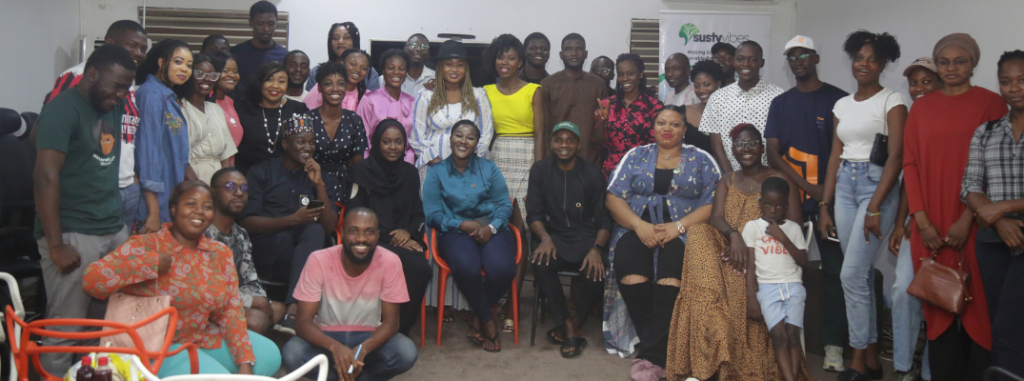On the 26th of November, we screened the Netflix movie: “Don’t Look Up” and as well had some wholesome post-COP27 discussions. Our amazing moderators for the event were SustyVibers: Peace Simon and Aniebiet Obot. We started by having our intervibes session, where SustyVibers: Enomfon Akpan and Folmi Yahaya asked arriving guests about what they think about climate change, the environment and pollution. One of the people interviewed, Onyinye, expressed that climate change is quite evident as there has been recent flooding and inconsistent rainfall patterns in Abuja.
The Movie Screening
We kickstarted this at 4 PM and on the completion of the movie at 6:23 PM, there were conversations amongst the participants about the lessons gleaned from the movie. The majority said, “the movie showcases what is going on presently in the world, especially around getting people to believe that climate change exists”.
Post COP27 Panel Discussion
It was an absolute pleasure to have the presence of Akintunde Babatunde, Lauritta Boniface and Fatima Aliyu Magaji who were attendees of the COP27 event handle this session. After the panellists were introduced, some of the questions our panellists were asked went thus;
- What does COP mean to you, and why did you choose to attend the COP?
Lauritta Boniface stated that she was trained and nominated to attend COP 27 as a negotiator, and as an activist attending COP meant a lot.
Akintunde Babatunde stated that he attended COP as a media personnel to report the reality of climate change using social media as a tool.
Fatima Magaji stated that going to COP is a necessity as an activist for sustainability. She mentioned that attending side events helped her amplify her work in the sustainability sector. Her agenda for COP was to pull strategic partnerships for the work she is currently doing and also for future work.
- What were your expectations going into COP 27?
Lauritta mentioned that as a negotiator, one important task was to understand Africa’s position. She wanted any decision taken to be human-centred. She expressed that she was excited about the loss and damage negotiations although they were inconclusive.
- What were the outcomes of COP27 for you as a media person?
Akintunde mentioned that COP 27 was taken up from exactly where COP26 ended. He stated that climate change is not just an emotional or environmental conversation but it is a political, social and economic conversation. From the media perspective, Nigeria’s alarming environmental issues are peculiar to Nigeria. They are developmental and infrastructural damages due to improper control. He ended his speech by saying that Nigeria is not financially strong yet to take positions.
- Were there any commitments made by Nigeria? Also, what does loss and damage mean?
Fatima stated that the major commitment made by Nigeria was at COP26, which was to recover degraded land, passing the climate change act, launching the climate change council, and launching an energy transmission plan, no new commitments were made at COP27.
She added that loss and damage may seem technical to some people but it is simply loss of things that cannot be replaced, example – loss of lives, loss of farm lands, economic loss, homes lost to flood. She went ahead to say that loss and damage encompasses mitigation and cuts across adaptation.
Further discussions were made on how to convince an average Nigerian to take climate action and the need to include climate change education in school curriculum. Lauritta answered by saying that we can get people to understand the issues surrounding climate change by using their dialect to communicate with them and using problems peculiar to their community to give a clearer understanding of the pending danger. Also, Fatima stated that the department of climate change Nigeria is working on a curriculum and that there will be a need for a synergy between the climate change department and the ministry of education, Nigeria for the launching of the curriculum in the educational sector.
FEEDBACK FROM PARTICIPANTS
- The movie is about our inactions and nonchalant attitude of people towards the signs of adverse climatic conditions and its overall consequences on our immediate environment.
- The movie depicted the religious, political, gender and financial biases citizens have about valid data-driven information provided about climate change and how it will impact us if we fail to take appropriate mitigation actions regardless of our statuses.
In the end, participants were given light refreshments and a group photograph was taken. The event ended at 7:15 PM.

